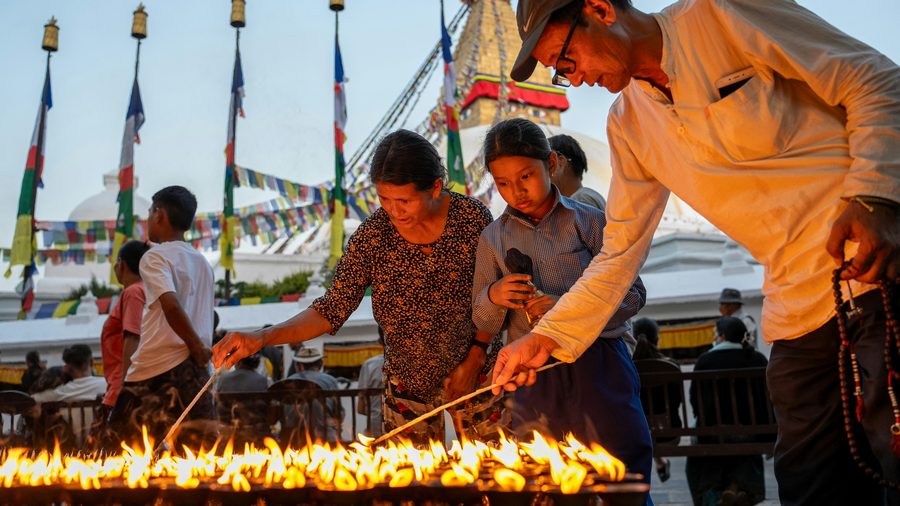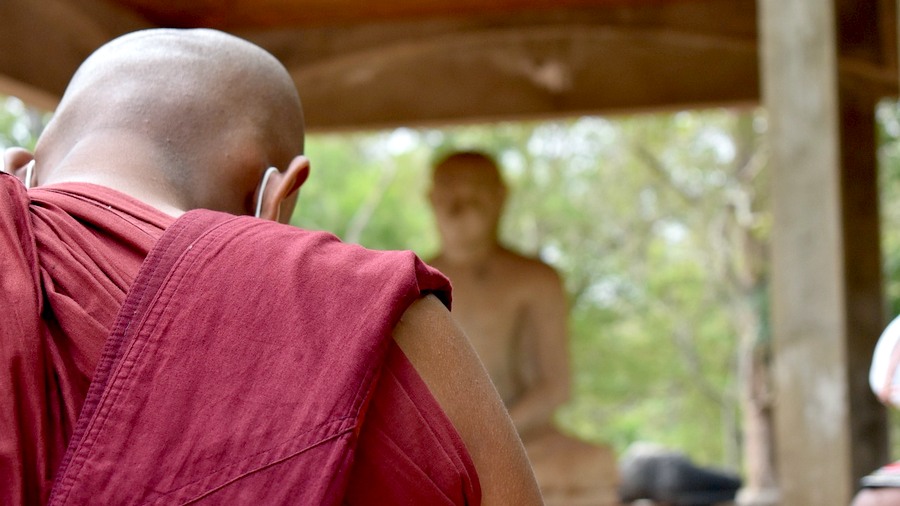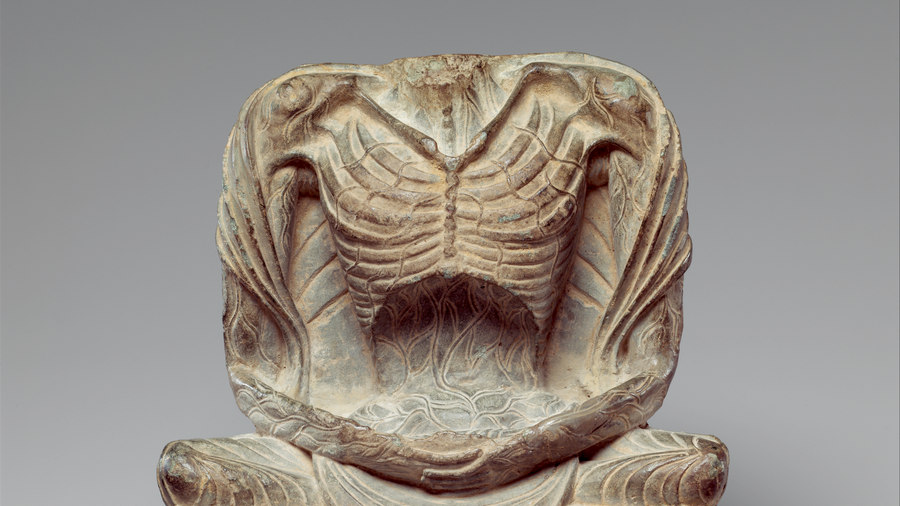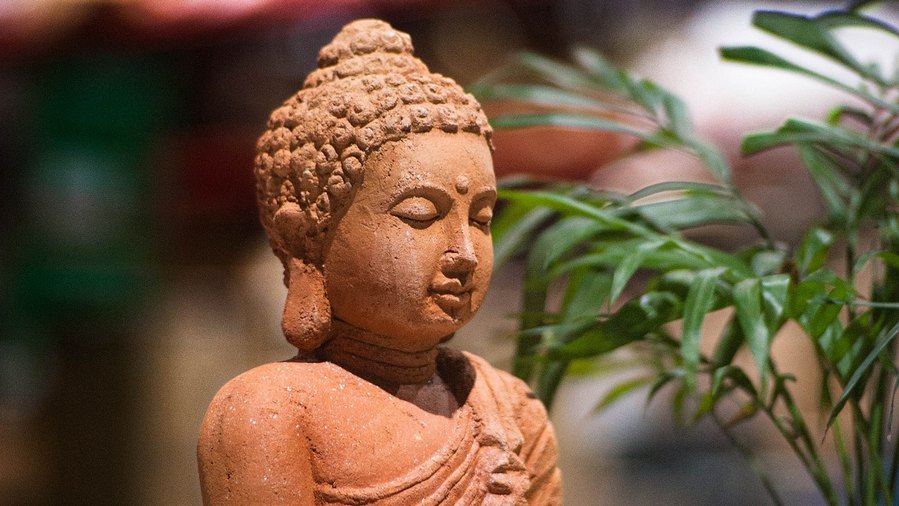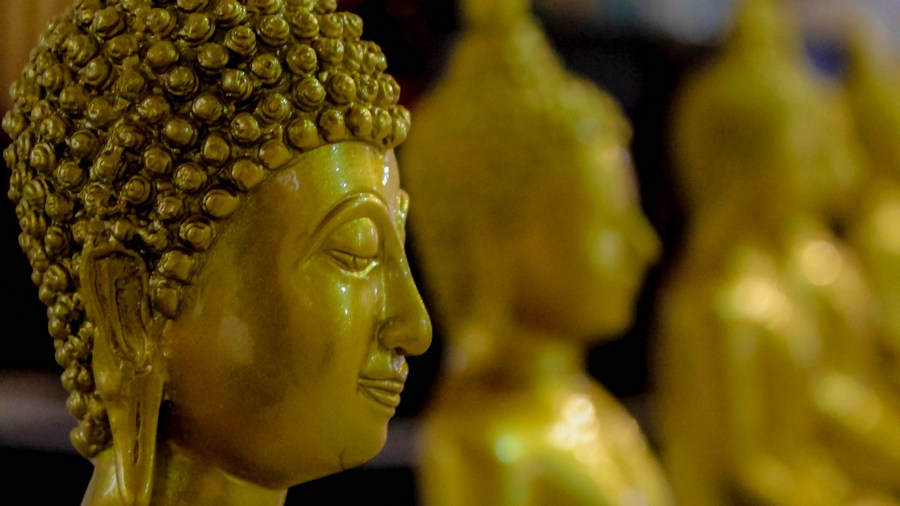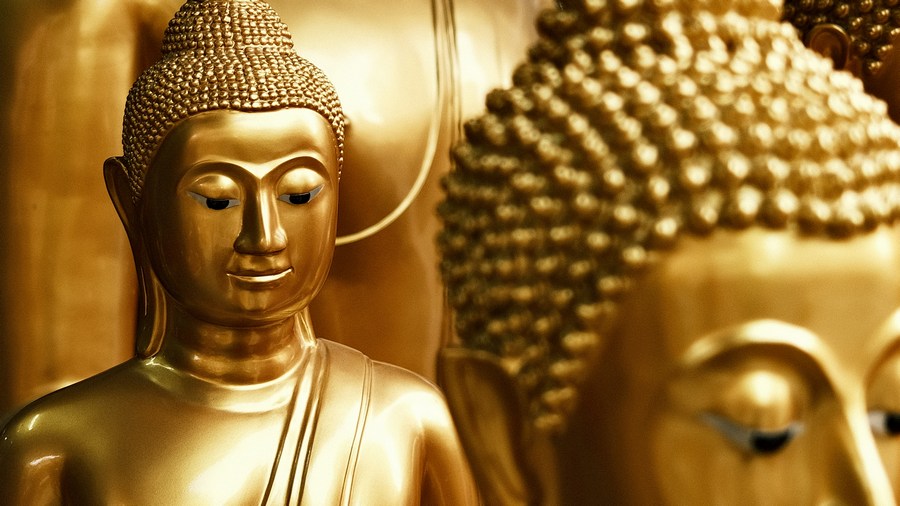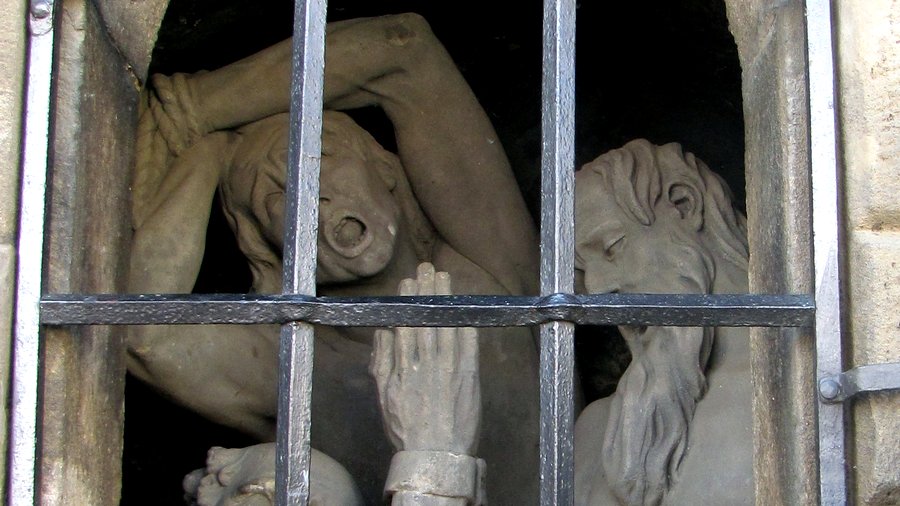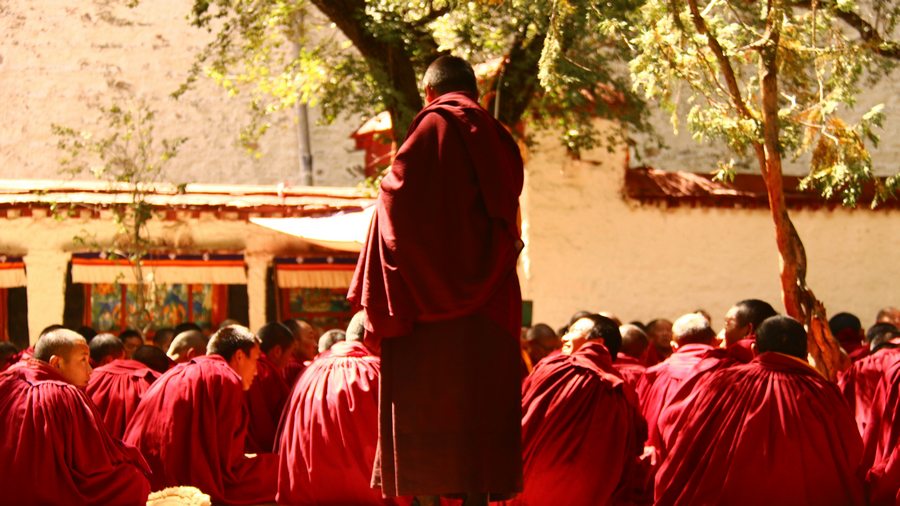[Note: Today’s selection is the first half of a much longer sutta. It deals directly with misunderstandings about actions and their results, so try to read as much as you can.]
I have heard that on one occasion the Blessed One was staying among the Sakyans. Now the Sakyans have a city named Devadaha, and there the Blessed One addressed the monks: “Monks!”
“Yes, lord,” the monks responded to him.
The Blessed One said, “Monks, there are some contemplatives & brahmans who teach in this way, who have this view: ‘Whatever a person experiences—pleasure, pain, or neither pleasure nor pain—all is caused by what was done in the past. Thus, with the destruction of old actions through asceticism, and with the non-doing of new actions, there will be no flow into the future. With no flow into the future, there is the ending of action. With the ending of action, the ending of stress. With the ending of stress, the ending of feeling. With the ending of feeling, all suffering & stress will be exhausted.’ Such is the teaching of the Nigaṇṭhas.
“Going to Nigaṇṭhas who teach in this way, I have asked them, ‘Is it true, friend Nigaṇṭhas, that you teach in this way, that you have this view: “Whatever a person experiences—pleasure, pain, or neither pleasure nor pain—all is caused by what was done in the past. Thus, with the destruction of old actions through asceticism, and with the non-doing of new actions, there will be no flow into the future. With no flow into the future, there is the ending of action. With the ending of action, the ending of stress. With the ending of stress, the ending of feeling. With the ending of feeling, all suffering & stress will be exhausted”?’
“Having been asked this by me, the Nigaṇṭhas admitted it, ‘Yes.’
“So I said to them, ‘But friends, do you know that you existed in the past, and that you did not not exist?’
“‘No, friend.’
“‘And do you know that you did evil actions in the past, and that you did not not do them?’
“‘No, friend.’
“‘And do you know that you did such-and-such evil actions in the past?’
“‘No, friend.’
“‘And do you know that so-and-so much stress has been exhausted, or that so-and-so much stress remains to be exhausted, or that with the exhaustion of so-and-so much stress all stress will be exhausted?’
“‘No, friend.’
“‘But do you know what is the abandoning of unskillful qualities and the attainment of skillful qualities in the here & now?’
“‘No, friend.’
“‘So, friends, it seems that you don’t know that you existed in the past, and that you did not not exist… you don’t know what is the abandoning of unskillful qualities and the attainment of skillful qualities in the here & now. That being the case, it is not proper for you to assert that, “Whatever a person experiences—pleasure, pain, or neither pleasure nor pain—all is caused by what was done in the past. Thus, with the destruction of old actions through asceticism, and with the non-doing of new actions, there will be no flow into the future. With no flow into the future, there is the ending of action. With the ending of action, the ending of stress. With the ending of stress, the ending of feeling. With the ending of feeling, all suffering & stress will be exhausted.”
“‘If, however, you knew that you existed in the past, and that you did not not exist; if you knew that you did evil actions in the past, and that you did not not do them; if you knew that you did such-and-such evil actions in the past; you don’t know that so-and-so much stress has been exhausted, or that so-and-so much stress remains to be exhausted, or that with the exhaustion of so-and-so much stress all stress will be exhausted; if you knew what is the abandoning of unskillful qualities and the attainment of skillful qualities in the here & now, then—that being the case—it would be proper for you to assert that, “Whatever a person experiences—pleasure, pain, or neither pleasure nor pain—all is caused by what was done in the past. Thus, with the destruction of old actions through asceticism, and with the non-doing of new actions, there will be no flow into the future. With no flow into the future, there is the ending of action. With the ending of action, the ending of stress. With the ending of stress, the ending of feeling. With the ending of feeling, all suffering & stress will be exhausted.”
“‘Friend Nigaṇṭhas, it’s as if a man were shot with an arrow thickly smeared with poison. As a result of being shot with the arrow, he would feel fierce, sharp, racking pains. His friends & companions, kinsmen & relatives would provide him with a surgeon. The surgeon would cut around the opening of the wound with a knife. As a result of the surgeon’s cutting around the opening of the wound with a knife, the man would feel fierce, sharp, racking pains. The surgeon would probe for the arrow with a probe. As a result of the surgeon’s probing for the arrow with a probe, the man would feel fierce, sharp, racking pains. The surgeon would then pull out the arrow. As a result of the surgeon’s pulling out the arrow, the man would feel fierce, sharp, racking pains. The surgeon would then apply a burning medicine to the mouth of the wound. As a result of the surgeon’s applying a burning medicine to the mouth of the wound, the man would feel fierce, sharp, racking pains. But then at a later time, when the wound had healed and was covered with skin, he would be well & happy, free, master of himself, able to go wherever he liked. The thought would occur to him, “Before, I was shot with an arrow thickly smeared with poison. As a result of being shot with the arrow, I felt fierce, sharp, racking pains. My friends & companions, kinsmen & relatives provided me with a surgeon… The surgeon cut around the opening of the wound with a knife… probed for the arrow with a probe… pulled out the arrow… applied a burning medicine to the mouth of the wound. As a result of his applying a burning medicine to the mouth of the wound, I felt fierce, sharp, racking pains. But now that the wound is healed and covered with skin, I am well & happy, free, master of myself, able to go wherever I like.”
“‘In the same way, friend Nigaṇṭhas, if you knew that you existed in the past, and that you did not not exist… if you knew what is the abandoning of unskillful qualities and the attainment of skillful qualities in the here & now, then—that being the case—it would be proper for you to assert that, “Whatever a person experiences—pleasure, pain, or neither pleasure nor pain—all is caused by what was done in the past. Thus, with the destruction of old actions through asceticism, and with the non-doing of new actions, there will be no flow into the future. With no flow into the future, there is the ending of action. With the ending of action, the ending of stress. With the ending of stress, the ending of feeling. With the ending of feeling, all suffering & stress will be exhausted.” But because you do not know that you existed in the past… you do not know what is the abandoning of unskillful qualities and the attainment of skillful qualities in the here & now, then—that being the case—it is not proper for you to assert that, “Whatever a person experiences—pleasure, pain, or neither pleasure nor pain—all is caused by what was done in the past. Thus, with the destruction of old actions through asceticism, and with the non-doing of new actions, there will be no flow into the future. With no flow into the future, there is the ending of action. With the ending of action, the ending of stress. With the ending of stress, the ending of feeling. With the ending of feeling, all suffering & stress will be exhausted.”
“When this was said, the Nigaṇṭhas said to me, ‘Friend, the Nigaṇṭha Nāṭaputta [the leader of the Nigaṇṭhas] is all-knowing, all-seeing, and claims total knowledge & vision thus: “Whether I am walking or standing, sleeping or awake, knowledge & vision are continuously & continually established in me.” He has told us, “Nigaṇṭhas, there are evil actions that you have done in the past. Exhaust them with these painful austerities. When in the present you are restrained in body, restrained in speech, and restrained in mind, that is the non-doing of evil action for the future. Thus, with the destruction of old actions through asceticism, and with the non-doing of new actions, there will be no flow into the future. With no flow into the future, there is the ending of action. With the ending of action, the ending of stress. With the ending of stress, the ending of feeling. With the ending of feeling, all suffering & stress will be exhausted.” We approve of that (teaching), prefer it, and are gratified by it.’
“When this was said, I said to the Nigaṇṭhas, ‘Friend Nigaṇṭhas, there are five things that can turn out in two ways in the here & now. Which five? Conviction, liking, unbroken tradition, reasoning by analogy, & an agreement through pondering views. These are the five things that can turn out in two ways in the here & now. That being the case, what kind of conviction do you have for your teacher with regard to the past? What kind of liking? What kind of unbroken tradition? What kind of reasoning by analogy? What kind of agreement through pondering views?’ But when I said this, I did not see that the Nigaṇṭhas had any legitimate defense of their teaching.
“So I asked them further, ‘Friend Nigaṇṭhas, what do you think? When there is fierce striving, fierce exertion, do you feel fierce, sharp, racking pains from harsh treatment? And when there is no fierce striving, no fierce exertion, do you feel no fierce, sharp, racking pains from harsh treatment?’
“‘Yes, friend…’
“‘… Then it’s not proper for you to assert that, “Whatever a person experiences—pleasure, pain, or neither pleasure nor pain—all is caused by what was done in the past. Thus, with the destruction of old actions through asceticism, and with the non-doing of new actions, there will be no flow into the future. With no flow into the future, there is the ending of action. With the ending of action, the ending of stress. With the ending of stress, the ending of feeling. With the ending of feeling, all suffering & stress will be exhausted.”
“‘If it were the case that when there was fierce striving, fierce exertion, you felt fierce, sharp, racking pains from harsh treatment; and when there was no fierce striving, no fierce exertion, you still felt fierce, sharp, racking pains from harsh treatment, then—that being the case—it would be proper for you to assert that, “Whatever a person experiences—pleasure, pain, or neither pleasure nor pain—all is caused by what was done in the past. Thus, with the destruction of old actions through asceticism, and with the non-doing of new actions, there will be no flow into the future. With no flow into the future, there is the ending of action. With the ending of action, the ending of stress. With the ending of stress, the ending of feeling. With the ending of feeling, all suffering & stress will be exhausted.” But because when there is fierce striving, fierce exertion, you feel fierce, sharp, racking pains from harsh treatment; and when there was no fierce striving, no fierce exertion, you feel no fierce, sharp, racking pains from harsh treatment, then—that being the case—it is not proper for you to assert that, “Whatever a person experiences—pleasure, pain, or neither pleasure nor pain—all is caused by what was done in the past. Thus, with the destruction of old actions through asceticism, and with the non-doing of new actions, there will be no flow into the future. With no flow into the future, there is the ending of action. With the ending of action, the ending of stress. With the ending of stress, the ending of feeling. With the ending of feeling, all suffering & stress will be exhausted.”’ But when I said this, I did not see that the Nigaṇṭhas had any legitimate defense of their teaching.
“So I asked them further, ‘Friend Nigaṇṭhas, what do you think? Can an action to be experienced in the here & now be turned, through striving & exertion, into an action to be experienced in the future life?’
“‘No, friend.’
“‘Can an action to be experienced in the future life be turned, through striving & exertion, into an action to be experienced in the here & now?’
“‘No, friend.’
“What do you think? Can an action to be experienced as pleasure be turned, through striving & exertion, into an action to be experienced as pain?’
“‘No, friend.’
“‘Can an action to be experienced as pain be turned, through striving & exertion, into an action to be experienced as pleasure?’
“‘No, friend.’
“What do you think? Can an action ripe to be experienced be turned, through striving & exertion, into an action not ripe to be experienced?’
“‘No, friend.’
“‘Can an action not ripe to be experienced be turned, through striving & exertion, into an action ripe to be experienced?’
“‘No, friend.’
“What do you think? Can an action greatly to be experienced be turned, through striving & exertion, into an action barely to be experienced?’
“‘No, friend.’
“‘Can an action barely to be experienced be turned, through striving & exertion, into an action greatly to be experienced?’
“‘No, friend.’
“What do you think? Can an action to be experienced be turned, through striving & exertion, into an action not to be experienced?’
“‘No, friend.’
“‘Can an action not to be experienced be turned, through striving & exertion, into an action to be experienced?’
“‘No, friend.’
“‘So, friends, it seems that an action to be experienced in the here & now cannot be turned, through striving & exertion, into an action to be experienced in the future life. An action to be experienced in the future life cannot be turned, through striving & exertion, into an action to be experienced in the here & now.… An action to be experienced cannot be turned, through striving & exertion, into an action not to be experienced. An action not to be experienced cannot be turned, through striving & exertion, into an action to be experienced. That being the case, the striving of the Nigaṇṭhas is fruitless, their exertion is fruitless.’
“Such is the teaching of the Nigaṇṭhas. And, such being the teaching of the Nigaṇṭhas, ten legitimate deductions can be drawn that give grounds for censuring them.
“[1] If beings experience pleasure & pain based on what was done in the past, then obviously the Nigaṇṭhas have done bad things in the past, which is why they now feel such fierce, sharp, racking pains.
“[2] If beings experience pleasure & pain based on the creative act of a supreme god, then obviously the Nigaṇṭhas have been created by an evil supreme god, which is why they now feel such fierce, sharp, racking pains.
“[3] If beings experience pleasure & pain based on sheer luck, then obviously the Nigaṇṭhas have evil luck, which is why they now feel such fierce, sharp, racking pains.
“[4] If beings experience pleasure & pain based on birth, then obviously the Nigaṇṭhas have had an evil birth, which is why they now feel such fierce, sharp, racking pains.
“[5] If beings experience pleasure & pain based on efforts in the here & now, then obviously the Nigaṇṭhas have evil efforts in the here & now, which is why they now feel such fierce, sharp, racking pains.
“[6] If beings experience pleasure & pain based on what was done in the past, the Nigaṇṭhas deserve censure. Even if not, they still deserve censure.
“[7] If beings experience pleasure & pain based on the creative act of a supreme god, the Nigaṇṭhas deserve censure. Even if not, they still deserve censure.
“[8] If beings experience pleasure & pain based on sheer luck, the Nigaṇṭhas deserve censure. Even if not, they still deserve censure.
“[9] If beings experience pleasure & pain based on birth, the Nigaṇṭhas deserve censure. Even if not, they still deserve censure.
“[10] If beings experience pleasure & pain based on efforts in the here & now, the Nigaṇṭhas deserve censure. Even if not, they still deserve censure.
“Such is the teaching of the Nigaṇṭhas, monks. And, such being the teaching of the Nigaṇṭhas, these ten legitimate deductions can be drawn that give grounds for censuring them. This is how striving is fruitless, how exertion is fruitless.
“And how is striving fruitful, how is exertion fruitful? There is the case where a monk, when not loaded down, does not load himself down with pain, nor does he reject pleasure that accords with the Dhamma, although he is not infatuated on that pleasure. He discerns that ‘When I exert a [physical, verbal, or mental] fabrication against this cause of stress, then from the fabrication of exertion there is dispassion. When I look on with equanimity at that cause of stress, then from the development of equanimity there is dispassion.’ So he exerts a fabrication against the cause of stress for which dispassion comes from the fabrication of exertion, and develops equanimity with regard to the cause of stress for which dispassion comes from the development of equanimity. Thus the stress coming from the cause of stress where there is dispassion from the fabrication of exertion is exhausted, and the stress coming from the cause of stress where there is dispassion from the development of equanimity is exhausted.
“Suppose that a man is in love with a woman, his mind ensnared with fierce desire, fierce passion. He sees her standing with another man, chatting, joking, & laughing. What do you think, monks? As he sees her standing with another man, chatting, joking, & laughing, would sorrow, lamentation, pain, distress, & despair arise in him?”
“Yes, lord. Why is that? Because he is in love with her, his mind ensnared with fierce desire, fierce passion.…”
“Now suppose the thought were to occur to him, ‘I am in love with this woman, my mind ensnared with fierce desire, fierce passion. When I see her standing with another man, chatting, joking, & laughing, then sorrow, lamentation, pain, distress, & despair arise within me. Why don’t I abandon my desire & passion for that woman?’ So he abandons his desire & passion for that woman, and afterwards sees her standing with another man, chatting, joking, & laughing. What do you think, monks? As he sees her standing with another man, chatting, joking, & laughing, would sorrow, lamentation, pain, distress, & despair arise in him?”
“No, lord. Why is that? He is dispassionate toward that woman.…”
“In the same way, the monk, when not loaded down, does not load himself down with pain, nor does he reject pleasure that accords with the Dhamma, although he is not infatuated with that pleasure. He discerns that ‘When I exert a [physical, verbal, or mental] fabrication against this cause of stress, then from the fabrication of exertion there is dispassion. When I look on with equanimity at that cause of stress, then from the development of equanimity there is dispassion.’ So he exerts a fabrication against the cause of stress for which dispassion comes from the fabrication of exertion, and develops equanimity with regard to the cause of stress for which dispassion comes from the development of equanimity. Thus the stress coming from the cause of stress where there is dispassion from the fabrication of exertion is exhausted, and the stress coming from the cause of stress where there is dispassion from the development of equanimity is exhausted.
“And further, the monk notices this: ‘When I live according to my pleasure, unskillful qualities increase in me & skillful qualities decline. When I exert myself with stress & pain, though, unskillful qualities decline in me & skillful qualities increase. Why don’t I exert myself with stress & pain?’ So he exerts himself with stress & pain, and while he is exerting himself with stress & pain, unskillful qualities decline in him, & skillful qualities increase. Then at a later time he would no longer exert himself with stress & pain. Why is that? Because he has attained the goal for which he was exerting himself with stress & pain. That is why, at a later time, he would no longer exert himself with stress & pain.
“Suppose a fletcher were to heat & warm an arrow shaft between two flames, making it straight & pliable. Then at a later time he would no longer heat & warm the shaft between two flames, making it straight & pliable. Why is that? Because he has attained the goal for which he was heating & warming the shaft. That is why at a later time he would no longer heat & warm the shaft between two flames, making it straight & pliable.
“In the same way, the monk notices this: ‘When I live according to my pleasure, unskillful qualities increase in me & skillful qualities decline. When I exert myself with stress & pain, though, unskillful qualities decline in me & skillful qualities increase. Why don’t I exert myself with stress & pain?’ So he exerts himself with stress & pain, and while he is exerting himself with stress & pain, unskillful qualities decline in him, & skillful qualities increase. Then at a later time he would no longer exert himself with stress & pain. Why is that? Because he has attained the goal for which he was exerting himself with stress & pain. That is why, at a later time, he would no longer exert himself with stress & pain.
“This is how striving is fruitful, how exertion is fruitful.…
Read the entire translation of Majjhima Nikāya 101 Devadaha Sutta. At Devadahaby Bhikkhu Ṭhanissaro on DhammaTalks.org. Or read a different translation on SuttaCentral.net. Or listen on PaliAudio.com or SC-Voice.net. Or explore the Pali on DigitalPaliReader.online.
Or read a translation in Русский, বাংলা, Català, Deutsch, Español, हिन्दी, Bahasa Indonesia, Italiano, 日本語, မြန်မာဘာသာ, Norsk, Português, සිංහල, Slovenščina, Srpski, ไทย, Tiếng Việt, or 汉语. Learn how to find your language.



